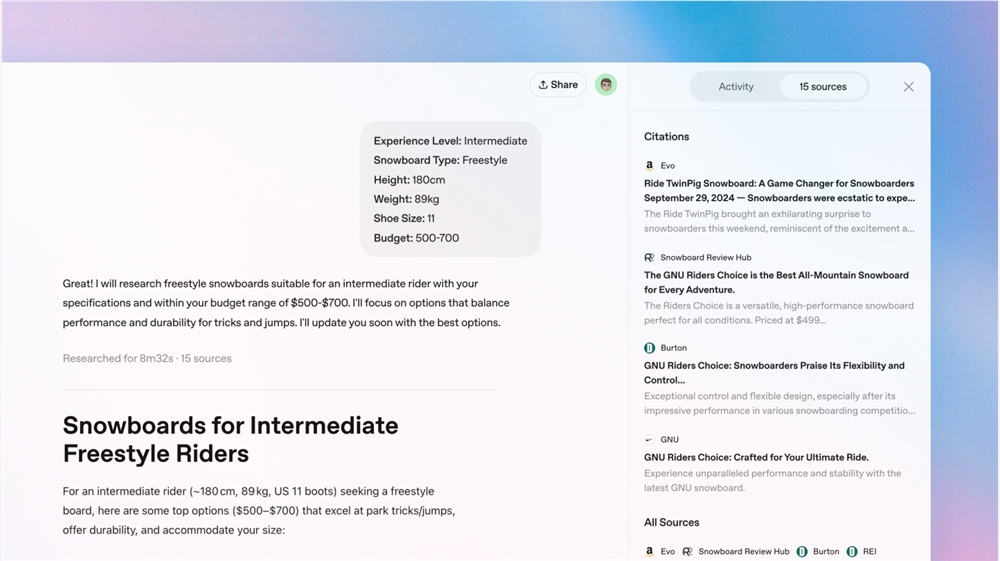OpenAI's Deep Research introduces a brand new deep research capability for ChatGPT. It can utilize publicly available web data to conduct multi-step deep research, extracting key content from vast amounts of information and generating reports, significantly enhancing the efficiency of information retrieval and processing.
Recently, OpenAI's CEO Sam Altman posted on X (formerly Twitter) stating that OpenAI will soon provide its deep research model to users at the free tier of ChatGPT.

Introduction to OpenAI Deep Research
Deep Research is an AI research feature developed by OpenAI for ChatGPT Pro users. It is fine-tuned based on the upcoming OpenAI o3 inference model, capable of autonomously searching and reading information across diverse online resources. Unlike traditional search methods, it does not simply aggregate information; instead, it deeply analyzes and filters materials on complex topics to create comprehensive reports with detailed citations, helping users efficiently acquire in-depth information.
Highlights of OpenAI Deep Research
- Multilingual Retrieval: Supports retrieval in almost all languages, breaking through language barriers, allowing for quick collection of academic literature, news reports, and other materials in any language.
- Deep Extraction and Integration: In the face of massive information, it can accurately extract key content, analyze deeply, and integrate information from multiple channels, such as identifying core points from numerous web pages, PDFs, images, and more.
- Automatic Report Generation: Can compile research results into professional documents, with complete report content and clear citations, making it easy for users to verify sources and enhancing the credibility of the reports.
- Complex Task Handling: Skilled in managing complex, multi-layered query tasks, efficiently addressing information retrieval needs that require cross-referencing multiple websites and multiple steps.
- Research Process Display: During the research process, it shows its thought process and the websites visited in a sidebar, allowing users to understand the information retrieval pathways and filtering logic.
- Support for Multiple Input Formats: Users can not only ask questions in text but also upload images, files, spreadsheets, etc., providing richer background information for their queries, making research more targeted.

Applicable Scenarios
- Academic Research: Researchers can quickly gather multilingual academic materials, organize, and generate research reports to assist in literature reviews and other tasks.
- Business Analysis: Product managers can use it to collect industry information, analyze market trends, and compile competitor data when planning new products or analyzing competitors, saving a significant amount of time and effort.
- Advertising and Marketing: Advertising professionals can have it write ad placement tutorials and provide SEO optimization suggestions, supporting advertising strategies.
- Healthcare: Ordinary users can receive professional advice along with citation sources when seeking medical information, helping them gain a more comprehensive understanding of conditions and treatments.
- Educational Consulting: Students and parents can receive information references for school and major selection when filling out applications, aiding in decision-making.
How to Use OpenAI Deep Research

- Ensure you are a ChatGPT Pro user and open ChatGPT on any client (web, iOS, Android, MacOS, Windows).
- Select "Deep Research" in the input box of ChatGPT.
- Clearly and accurately enter your request, such as "Conduct a market competition analysis for a certain product." If you have related images, files, spreadsheets, etc., feel free to upload them for more background information.
- After entering, wait for 5 - 30 minutes, during which you can view the research process displayed in the sidebar. Deep Research will search the web, analyze text, PDFs, images, etc., in the background, and then synthesize the results.
- Finally, view the generated report in the chat window, which includes clear citations for easy verification. If you are not satisfied with the results, you can adjust the query and research again.

Conclusion
OpenAI's Deep Research feature provides users with powerful information processing capabilities, showcasing great potential across various fields such as academia, business, and daily life, significantly improving the efficiency of information collection and organization, becoming a valuable assistant for many in their work and studies.
However, it is not without flaws, facing issues such as data lag and the inability to replace human deep thinking. With ongoing technological advancements, it is believed that Deep Research will continue to optimize and improve. Users are encouraged to actively try it out, and any discoveries or thoughts during use can be shared and discussed in the comments section.









